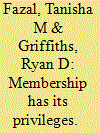| Srl | Item |
| 1 |
ID:
130930


|
|
|
|
|
| Publication |
2014.
|
| Summary/Abstract |
We argue that system-level international changes have made secessionism more attractive since 1945, and that this is one of the reasons for the recent Proliferation of Aspiring States. Using original data on secessionist movements between 1816 and 2011, we document that secessionism became significantly more common after 1945. Whereas much of the existing literature explains secessionism by pointing to local or unit-level factors, we contend that security, economic, and normative changes at the international level have effectively increased the benefits of independence, without a commensurate increase in the costs. We use interviews with representatives of new states, secessionist groups, and international organizations to provide empirical support for these claims. We conclude by considering three extensions of our argument: (i) Does the nature of the changing international environment affect the way in which secessionists attempt to achieve their goals? (ii) What future changes might amplify or depress this trend? (iii) Who are the specific people benefiting from statehood, and can their position within a would-be state help us understand the nature of secessionism today?
|
|
|
|
|
|
|
|
|
|
|
|
|
|
|
|
| 2 |
ID:
144059


|
|
|
|
|
| Summary/Abstract |
Norm dynamics studies typically accord a special status to norm entrepreneurs, actors who promote new global norms. But conceptually privileging these agents of change has meant the norm dynamics literature has become unbalanced and marred by case selection bias. Accordingly, an oppositional role – the ‘norm antipreneur’ – should be recognised to correct these problems. When the normative status quo in an issue-area is entrenched, a clear distinction can be drawn between the entrepreneurs and antipreneurs, because in these contexts the antipreneurs enjoy significant but under-appreciated tactical and strategic advantages. Recognising this enables the construction of a norm dynamics role-spectrum – a sort of ‘typology of roles’ – including ‘competitor entrepreneur’ and ‘creative resister’ in addition to the entrepreneur and antipreneur roles which actors might play in particular norm contestation contexts. Understanding these roles promises to improve analyses of the dynamic interactions between actors in particular norm contestation processes, thereby bringing greater overall balance to the norm dynamics literature.
|
|
|
|
|
|
|
|
|
|
|
|
|
|
|
|
| 3 |
ID:
095756


|
|
|
|
|
| Publication |
2010.
|
| Summary/Abstract |
The U. S.-ROK alliance has been through tough times since the first North Korean nuclear crisis. The two allies suffer from a lack of trust and cooperation at various levels of interaction. This research interprets the uneasy relationship as an outcome of paradigm conflict inherent between the rational United States and normative South Korea. After a review of the history of the alliance from the structural perspective, the author traces the cause of the recent conflict to the normative change that occurred in South Korea during the 1990s: leaving the Korean War experiences behind and accepting North Korea as a brother.
|
|
|
|
|
|
|
|
|
|
|
|
|
|
|
|